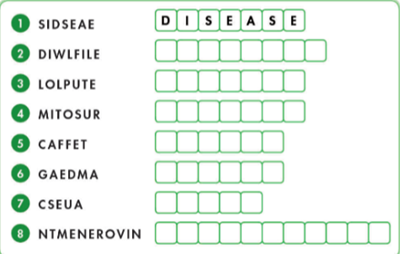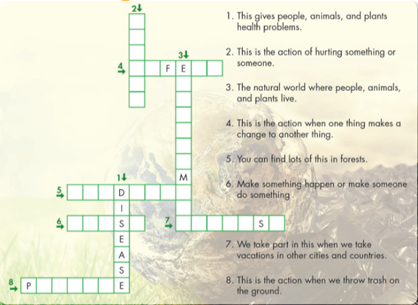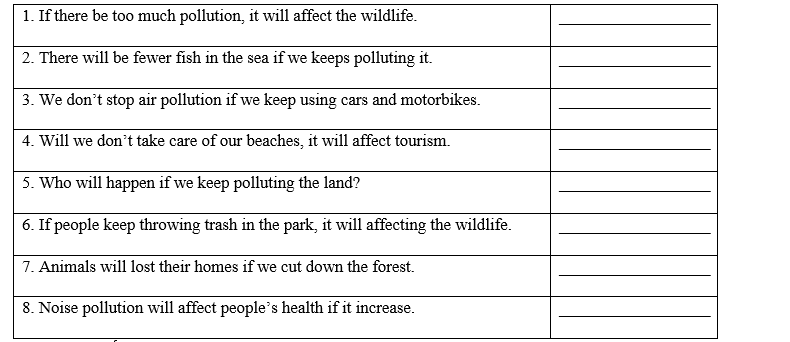Lesson 1 - Unit 3. Protecting the environment - SBT Tiếng Anh 8 iLearn Smart World
a. Unscramble the words. b. Do the crossword puzzle. a. Read the essay. Which effect of pollution is NOT mentioned?b. Now, read and answer the questions. Underline the mistakes and write the correct words on the lines. Complete the questions and write your own answers in full sentences.
New Words a
a. Unscramble the words.
(Sắp xếp các từ sau.)

Lời giải chi tiết:
1. disease (bệnh tật)
2. wildlife (động vật hoang dã)
3. pollute (gây ô nhiễm)
4. tourism (du lịch)
5. affect (ảnh hưởng)
6. damage (thiệt hại)
7. cause (nguyên nhân)
8. environment (môi trường)
New Words b
b. Do the crossword puzzle.
(Chơi trò giải ô chữ.)

Lời giải chi tiết:
1. This gives people, animal, and plants health problems. => disease.
(Điều này gây ra các vấn đề sức khỏe cho con người, động vật và thực vật. => bệnh tật.)
2. This is the action of hunting something or someone. => damage.
(Đây là hành động săn lùng một cái gì đó hoặc một ai đó. => thiệt hại.)
3. The natural world where people, animals, and plants live. => environment.
(Thế giới tự nhiên nơi con người, động vật và thực vật sinh sống. => môi trường.)
4. This is the action when one thing makes a change to another thing. => affect.
(Đây là hành động khi một vật làm thay đổi thành một vật khác. => ảnh hưởng.)
5. You can find lots of this in forests. => wildlife.
(Bạn có thể tìm thấy rất nhiều thứ này trong rừng. => động vật hoang dã.)
6. Make something happen or make someone do something. => cause.
(Khiến điều gì đó xảy ra hoặc khiến ai đó làm điều gì đó. => nguyên nhân.)
7. We take part in this when we take vacations in other cities and countries. => tourism.
(Chúng tôi tham gia vào việc này khi chúng tôi đi nghỉ ở các thành phố và quốc gia khác. => du lịch.)
8. This is the action when we throw trash on the ground. => pollute.
(Đây là hành động khi chúng ta vứt rác xuống đất. => gây ô nhiễm.)
Reading a
a. Read the essay. Which effect of pollution is NOT mentioned?
(Đọc bài luận. Ảnh hưởng nào của ô nhiễm KHÔNG được đề cập?)
1. headaches (nhức đầu)
2. scared animals (động vật sợ hãi)
3. reduced tourism (du lịch giảm sút)
In cities today, light pollution and noise pollution are affecting our health and the environment. In this essay, I will talk about the effects of these forms of pollution.
When there is too much light in an area, there is light pollution. Light pollution makes it difficult to see stars at night. Most people don’t think light is a big problem, but light pollution can cause headaches and make people feel stressed. Many animals prefer to live in the dark, so light pollution is also harmful to them.
Some noise has a negative effect on people or nature. We call it noise pollution. Transportation and machines cause the most noise pollution. Too much noise makes people stressed, and it can affect their heart’s health. It scares animals and makes it difficult for them to communicate with each other.
In conclusion, we should try to reduce light and noise pollution. This will improve people’s lives, help wildlife, and make our cities more peaceful and beautiful.
Tạm dịch:
Ở các thành phố hiện nay, ô nhiễm ánh sáng và ô nhiễm tiếng ồn đang ảnh hưởng đến sức khỏe và môi trường của chúng ta. Trong bài tiểu luận này, tôi sẽ nói về tác động của các dạng ô nhiễm này.
Khi có quá nhiều ánh sáng trong một khu vực, sẽ có ô nhiễm ánh sáng. Ô nhiễm ánh sáng khiến bạn khó nhìn thấy các vì sao vào ban đêm. Hầu hết mọi người không nghĩ rằng ánh sáng là một vấn đề lớn, nhưng ô nhiễm ánh sáng có thể gây đau đầu và khiến mọi người cảm thấy căng thẳng. Nhiều loài động vật thích sống trong bóng tối nên ô nhiễm ánh sáng cũng có hại cho chúng.
Một số tiếng ồn có tác động tiêu cực đến con người hoặc thiên nhiên. Chúng tôi gọi đó là ô nhiễm tiếng ồn. Giao thông vận tải và máy móc gây ô nhiễm tiếng ồn nhiều nhất. Quá nhiều tiếng ồn khiến mọi người căng thẳng và có thể ảnh hưởng đến sức khỏe tim mạch. Nó khiến động vật sợ hãi và khiến chúng khó giao tiếp với nhau.
Tóm lại, chúng ta nên cố gắng giảm ô nhiễm ánh sáng và tiếng ồn. Điều này sẽ cải thiện cuộc sống của mọi người, giúp ích cho động vật hoang dã và làm cho các thành phố của chúng ta trở nên yên bình và xinh đẹp hơn.
Lời giải chi tiết:
3. reduced tourism (du lịch giảm sút)
Thông tin: Most people don’t think light is a big problem, but light pollution can cause headaches and make people feel stressed. / Too much noise makes people stressed, and it can affect their heart’s health. It scares animals and makes it difficult for them to communicate with each other.
(Hầu hết mọi người không nghĩ rằng ánh sáng là một vấn đề lớn, nhưng ô nhiễm ánh sáng có thể gây đau đầu và khiến mọi người cảm thấy căng thẳng. / Quá nhiều tiếng ồn khiến mọi người căng thẳng và có thể ảnh hưởng đến sức khỏe tim mạch của họ. Nó khiến động vật sợ hãi và khiến chúng khó giao tiếp với nhau.)
Reading b
b. Now, read and answer the questions.
(Bây giờ, hãy đọc và trả lời các câu hỏi.)
1. What is difficult to see because of light pollution? (Điều gì khó nhìn thấy do ô nhiễm ánh sáng?)
_______________________________________________________
2. How can light pollution make people feel? (Ô nhiễm ánh sáng có thể khiến con người cảm thấy thế nào?)
_______________________________________________________
3. What causes the most noise pollution? (Nguyên nhân nào gây ô nhiễm tiếng ồn nhiều nhất?)
_______________________________________________________
4. What does noise pollution make difficult for animals to do? (Ô nhiễm tiếng ồn gây khó khăn cho động vật làm gì?)
_______________________________________________________
5. How will reducing light and noise pollution help cities? (Giảm ô nhiễm ánh sáng và tiếng ồn sẽ giúp ích gì cho các thành phố?)
_______________________________________________________
Lời giải chi tiết:
1. Because of light pollution, it is difficult to see stars.
(Vì ô nhiễm ánh sáng nên khó nhìn thấy các vì sao.)
Thông tin: Light pollution makes it difficult to see stars at night.
(Ô nhiễm ánh sáng khiến bạn khó nhìn thấy các vì sao vào ban đêm.)
2. Light pollution make people feel stressed.
(Ô nhiễm ánh sáng khiến mọi người cảm thấy căng thẳng.)
Thông tin: Most people don’t think light is a big problem, but light pollution can cause headaches and make people feel stressed.
(Hầu hết mọi người không nghĩ rằng ánh sáng là một vấn đề lớn, nhưng ô nhiễm ánh sáng có thể gây đau đầu và khiến mọi người cảm thấy căng thẳng.)
3. Transportation and machines cause the most noise pollution.
(Phương tiện giao thông và máy móc gây ô nhiễm tiếng ồn nhiều nhất.)
Thông tin: Transportation and machines cause the most noise pollution.
(Giao thông vận tải và máy móc gây ô nhiễm tiếng ồn nhiều nhất.)
4. Noise pollution make difficult for animals to communicate with each other.
(Ô nhiễm tiếng ồn khiến động vật khó giao tiếp với nhau.)
Thông tin: Too much noise makes people stressed, and it can affect their heart’s health. It scares animals and makes it difficult for them to communicate with each other.
(Quá nhiều tiếng ồn khiến mọi người căng thẳng và có thể ảnh hưởng đến sức khỏe tim mạch. Nó khiến động vật sợ hãi và khiến chúng khó giao tiếp với nhau.)
5. It will make them more peaceful and beautiful.
(Nó sẽ khiến họ yên bình và xinh đẹp hơn.)
Thông tin: In conclusion, we should try to reduce light and noise pollution. This will improve people’s lives, help wildlife, and make our cities more peaceful and beautiful.
(Tóm lại, chúng ta nên cố gắng giảm ô nhiễm ánh sáng và tiếng ồn. Điều này sẽ cải thiện cuộc sống của mọi người, giúp ích cho động vật hoang dã và làm cho các thành phố của chúng ta trở nên yên bình và xinh đẹp hơn.)
Grammar
Underline the mistakes and write the correct words on the lines.
(Gạch chân những lỗi sai và viết những từ đúng vào các dòng.)

Lời giải chi tiết:
1. If there be too much pollution, it will affect the wildlife.
Lỗi: be => is
Sửa lỗi: If there is too much pollution, it will affect the wildlife.
(Nếu có quá nhiều ô nhiễm, nó sẽ ảnh hưởng đến động vật hoang dã.)
2. There will be fewer fish in the sea if we keeps polluting it.
Lỗi: keeps => keep
Sửa lỗi: There will be fewer fish in the sea if we keep polluting it.
(Sẽ có ít cá hơn ở biển nếu chúng ta tiếp tục gây ô nhiễm.)
3. We don’t stop air pollution if we keep using cars and motorbikes.
Lỗi: don’t => won’t
Sửa lỗi: We won’t stop air pollution if we keep using cars and motorbikes.
(Chúng ta sẽ không ngăn được ô nhiễm không khí nếu chúng ta tiếp tục sử dụng ô tô và xe máy.)
4. Will we don’t take care of our beaches, it will affect tourism.
Lỗi: Will => If
Sửa lỗi: If we don’t take care of our beaches, it will affect tourism.
(Nếu chúng ta không chăm sóc các bãi biển của mình, nó sẽ ảnh hưởng đến du lịch.)
5. Who will happen if we keep polluting the land?
Lỗi: Who => What
Sửa lỗi: What will happen if we keep polluting the land?
(Điều gì sẽ xảy ra nếu chúng ta tiếp tục gây ô nhiễm đất?)
6. If people keep throwing trash in the park, it will affecting the wildlife.
Lỗi: affecting => affect
Sửa lỗi: If people keep throwing trash in the park, it will affect the wildlife.
(Nếu mọi người tiếp tục vứt rác trong công viên, nó sẽ ảnh hưởng đến động vật hoang dã.)
7. Animals will lost their homes if we cut down the forest.
Lỗi: lost => lose
Sửa lỗi: Animals will lose their homes if we cut down the forest.
(Động vật sẽ mất nhà nếu chúng ta chặt phá rừng.)
8. Noise pollution will affect people’s health if it increase.
Lỗi: increase => increases
Sửa lỗi: Noise pollution will affect people’s health if it increases.
(Ô nhiễm tiếng ồn sẽ ảnh hưởng đến sức khỏe của người dân nếu nó tăng lên.)
Writing
Complete the questions and write your own answers in full sentences.
(Hoàn thành các câu hỏi và viết câu trả lời của riêng bạn trong câu đầy đủ.)
1. What will happen if we keep pollution _________________?
If we ___________________________________________________________________________
2. What will happen if ________________________________?
If ______________________________________________________________________________
Lời giải chi tiết:
1. What will happen if we keep polluting lakes and rivers? (Điều gì sẽ xảy ra nếu chúng ta tiếp tục làm ô nhiễm sông hồ?)
=> If we keep polluting lakes and rivers, many more fish will die. (Nếu chúng ta tiếp tục làm ô nhiễm sông hồ, nhiều cá sẽ chết.)
2. What will happen if noise pollution increases? (Điều gì sẽ xảy ra nếu ô nhiễm tiếng ồn gia tăng?)
=> If noise pollution increases, people will become more stressed. (Nếu ô nhiễm tiếng ồn tăng lên, mọi người sẽ trở nên căng thẳng hơn.)
Luyện Bài Tập Trắc nghiệm Tiếng Anh 8 - iLearn Smart World - Xem ngay
Các bài khác cùng chuyên mục
- Semester 2 Mid-term Test - SBT Tiếng Anh 8 iLearn Smart World
- Semester 2 Final Test - SBT Tiếng Anh 8 iLearn Smart World
- Lesson 1 - Unit 8. Traditions of ethnic groups in Vietnam- SBT Tiếng Anh 8 iLearn Smart World
- Lesson 2 - Unit 8. Traditions of ethnic groups in Vietnam- SBT Tiếng Anh 8 iLearn Smart World
- Lesson 3 - Unit 8. Traditions of ethnic groups in Vietnam- SBT Tiếng Anh 8 iLearn Smart World


















